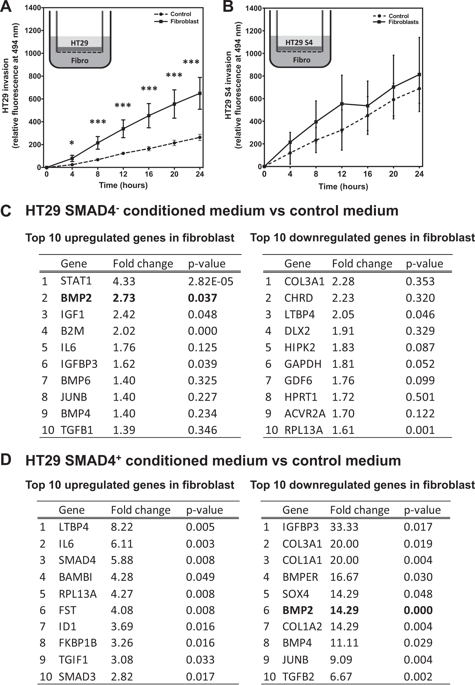Our official English website, www.x-mol.net, welcomes your
feedback! (Note: you will need to create a separate account there.)
Bidirectional tumor/stroma crosstalk promotes metastasis in mesenchymal colorectal cancer.
Oncogene ( IF 6.9 ) Pub Date : 2020-01-23 , DOI: 10.1038/s41388-020-1157-z Sarah Ouahoud 1 , Philip W Voorneveld 1 , Lennart R A van der Burg 1 , Eveline S M de Jonge-Muller 1 , Mark J A Schoonderwoerd 1 , Madelon Paauwe 1 , Thijs de Vos 1 , Sophie de Wit 1 , Gabi W van Pelt 2 , Wilma E Mesker 2 , Lukas J A C Hawinkels 1 , James C H Hardwick 1
Oncogene ( IF 6.9 ) Pub Date : 2020-01-23 , DOI: 10.1038/s41388-020-1157-z Sarah Ouahoud 1 , Philip W Voorneveld 1 , Lennart R A van der Burg 1 , Eveline S M de Jonge-Muller 1 , Mark J A Schoonderwoerd 1 , Madelon Paauwe 1 , Thijs de Vos 1 , Sophie de Wit 1 , Gabi W van Pelt 2 , Wilma E Mesker 2 , Lukas J A C Hawinkels 1 , James C H Hardwick 1
Affiliation

|
Patients with the mesenchymal subtype colorectal cancer (CRC) have a poor prognosis, in particular patients with stroma-rich tumors and aberrant SMAD4 expression. We hypothesized that interactions between SMAD4-deficient CRC cells and cancer-associated fibroblasts provide a biological explanation. In transwell invasion assays, fibroblasts increased the invasive capacity of SMAD4-deficient HT29 CRC cells, but not isogenic SMAD4-proficient HT29 cells. A TGF-β/BMP-specific array showed BMP2 upregulation by fibroblasts upon stimulation with conditioned medium from SMAD4-deficient CRC cells, while also stimulating their invasion. In a mouse model for experimental liver metastasis, the co-injection of fibroblasts increased metastasis formation of SMAD4-deficient CRC cells (p = 0.02) but not that of SMAD4-proficient CRC cells. Significantly less metastases were seen in mice co-injected with BMP2 knocked-down fibroblasts. Fibroblast BMP2 expression seemed to be regulated by TRAIL, a factor overexpressed in SMAD4-deficient CRC cells. In a cohort of 146 stage III CRC patients, we showed that patients with a combination of high stromal BMP2 expression and the loss of tumor SMAD4 expression had a significantly poorer overall survival (HR 2.88, p = 0.04). Our results suggest the existence of a reciprocal loop in which TRAIL from SMAD4-deficient CRC cells induces BMP2 in fibroblasts, which enhances CRC invasiveness and metastasis.
中文翻译:

双向肿瘤/基质间的串扰促进了间充质大肠癌的转移。
间质亚型结直肠癌(CRC)患者的预后较差,特别是间质丰富的肿瘤和SMAD4表达异常的患者。我们假设SMAD4缺陷的CRC细胞与癌症相关的成纤维细胞之间的相互作用提供了生物学解释。在穿孔侵袭试验中,成纤维细胞增加了SMAD4缺陷型HT29 CRC细胞的侵袭能力,但同基因的SMAD4缺陷型HT29 CRC细胞却没有。TGF-β/ BMP特异性阵列在受到来自SMAD4缺陷的CRC细胞的条件培养基刺激后,成纤维细胞显示BMP2上调,同时还刺激了它们的侵袭。在用于实验性肝转移的小鼠模型中,共注射成纤维细胞会增加SMAD4缺陷CRC细胞的转移形成(p = 0.02),而不是SMAD4缺陷CRC细胞的转移形成。在与BMP2组合的成纤维细胞共注射的小鼠中观察到的转移明显更少。成纤维细胞BMP2的表达似乎受到TRAIL的调节,TRAIL是SMAD4缺失的CRC细胞中过表达的一种因子。在146名III期CRC患者队列中,我们显示了具有高基质BMP2表达和肿瘤SMAD4表达缺失的患者,其总生存期明显较差(HR 2.88,p = 0.04)。我们的结果表明存在一个倒向环路,其中来自SMAD4缺陷的CRC细胞的TRAIL诱导成纤维细胞中的BMP2,从而增强了CRC的侵袭性和转移能力。我们发现具有高基质BMP2表达和肿瘤SMAD4表达缺失的患者的总生存期明显较差(HR 2.88,p = 0.04)。我们的结果表明存在一个倒向环路,其中来自SMAD4缺陷的CRC细胞的TRAIL诱导成纤维细胞中的BMP2,从而增强了CRC的侵袭性和转移能力。我们发现具有高基质BMP2表达和肿瘤SMAD4表达缺失的患者的总生存期明显较差(HR 2.88,p = 0.04)。我们的结果表明存在一个倒向环路,其中来自SMAD4缺陷的CRC细胞的TRAIL诱导成纤维细胞中的BMP2,从而增强了CRC的侵袭性和转移能力。
更新日期:2020-01-23
中文翻译:

双向肿瘤/基质间的串扰促进了间充质大肠癌的转移。
间质亚型结直肠癌(CRC)患者的预后较差,特别是间质丰富的肿瘤和SMAD4表达异常的患者。我们假设SMAD4缺陷的CRC细胞与癌症相关的成纤维细胞之间的相互作用提供了生物学解释。在穿孔侵袭试验中,成纤维细胞增加了SMAD4缺陷型HT29 CRC细胞的侵袭能力,但同基因的SMAD4缺陷型HT29 CRC细胞却没有。TGF-β/ BMP特异性阵列在受到来自SMAD4缺陷的CRC细胞的条件培养基刺激后,成纤维细胞显示BMP2上调,同时还刺激了它们的侵袭。在用于实验性肝转移的小鼠模型中,共注射成纤维细胞会增加SMAD4缺陷CRC细胞的转移形成(p = 0.02),而不是SMAD4缺陷CRC细胞的转移形成。在与BMP2组合的成纤维细胞共注射的小鼠中观察到的转移明显更少。成纤维细胞BMP2的表达似乎受到TRAIL的调节,TRAIL是SMAD4缺失的CRC细胞中过表达的一种因子。在146名III期CRC患者队列中,我们显示了具有高基质BMP2表达和肿瘤SMAD4表达缺失的患者,其总生存期明显较差(HR 2.88,p = 0.04)。我们的结果表明存在一个倒向环路,其中来自SMAD4缺陷的CRC细胞的TRAIL诱导成纤维细胞中的BMP2,从而增强了CRC的侵袭性和转移能力。我们发现具有高基质BMP2表达和肿瘤SMAD4表达缺失的患者的总生存期明显较差(HR 2.88,p = 0.04)。我们的结果表明存在一个倒向环路,其中来自SMAD4缺陷的CRC细胞的TRAIL诱导成纤维细胞中的BMP2,从而增强了CRC的侵袭性和转移能力。我们发现具有高基质BMP2表达和肿瘤SMAD4表达缺失的患者的总生存期明显较差(HR 2.88,p = 0.04)。我们的结果表明存在一个倒向环路,其中来自SMAD4缺陷的CRC细胞的TRAIL诱导成纤维细胞中的BMP2,从而增强了CRC的侵袭性和转移能力。









































 京公网安备 11010802027423号
京公网安备 11010802027423号